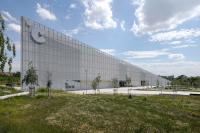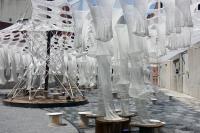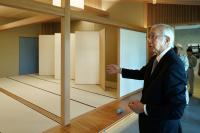Residential complex aspern
Wien, Austria
"With its varied development situation and the ecological choice of materials for the façade, the D12 residential complex is something special in the lakeside town of Aspern. Wood is one of the most intelligent building materials imaginable - renewable, decomposable in recycling - and it also has haptic qualities. In contrast to fully insulated façades, wood is a material that deliberately ages, greys, turns grey and also creates identity in an urban context."
Development
On site D12 in the south-eastern part of Seestadt Aspern is a residential complex with a total of 213 apartments and 8 stores. The buildings are connected by north-south running arcades in three rows. Starting from the edge of the city, the three access routes offer a varied spatial experience, which is created by the sequence of light-flooded stairwells, interior corridors and open arcades with docked communal terraces. The varied circulation situation serves as a communicative element.
Structure and materiality
The serial, linear basic structure offers great flexibility in the arrangement of different types of apartments and thus enables a good mix of residents and sustainable usability. As a special feature in the field of residential construction, the entire building was designed as a reinforced concrete skeleton construction with a minimized load-bearing structure to increase the long-term variability of use: Individual columns instead of concrete walls. The ecological exterior walls are designed as prefabricated, insulated timber frame components with untreated larch wood cladding. The façade is structured by cantilevered prefabricated loggias and balconies and was assembled on site as a complete component from the factory. The result is a free interplay.
Outdoor space
Wooden objects and surfaces are freely distributed, like stones in a canyon. The wooden cladding along the ramp walls grows out of the vertical in places and forms sloping surfaces to lean on or climb on. Large horizontal surfaces connect with the wall and form resting and usable areas. The façade structure is continued at certain points as floor markings, becomes denser in the entrance areas and structures the store front zone with street furniture.
- Architects
- querkraft
- Location
- Wien, Austria
- Year
- 2015
- Client
- EBG Gemeinnützige Ein- und Mehrfamilienhäuser Baugenossenschaft reg. Gen.m.b.h.
- Architektur
- Berger+Parkkinen Architekten ZT-Gmbh und querkraft architekten zt-gmbh
- Freiraumplanung
- idealice landschaftsarchitektur, Wien
- Bauphysik
- Holzforschung Austria, Wien
- Haustechnik
- TB Obkircher, Wien
- Statik
- Lackner + Raml Ziviltechniker GmbH, Villach
- Brandschutz
- brandRat zt gesmbh, Wien
- Versickerung
- ZT-Schattovitz, Wien
- Baufirma
- Porr Bau Gmbh, Wien
- Wohneinheiten
- 213
- Wohnungsgrößen
- 1-5 Zimmer-Wohnungen, 42 bis 110qm
- Hauptnutzfläche
- 15.700qm








